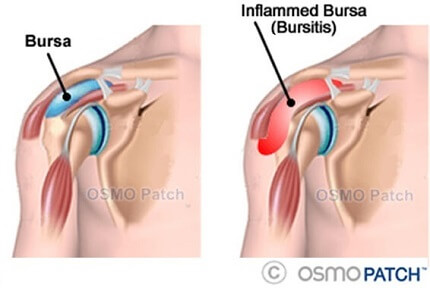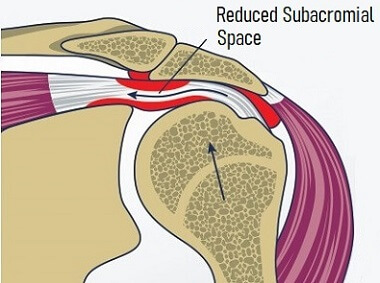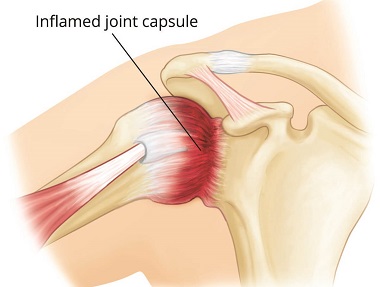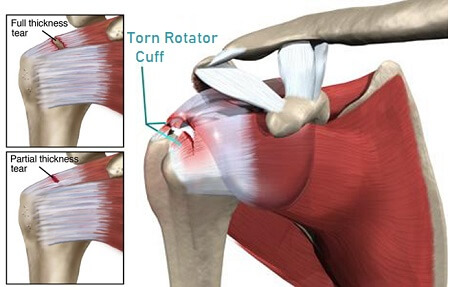- Home
- Diagnosis Guide
- Night Pain
Shoulder Pain At Night
Written By: Chloe Wilson BSc (Hons) Physiotherapy
Reviewed By: SPE Medical Review Board

Shoulder pain at night is a common problem that can affect people in different ways.
It doesn’t take much pain to affect sleep. You have pain during the day that gets worse in the evening, or it may be that you only notice your shoulder pain at night.
You might struggle to get comfy making it hard to drift off, or the pain may wake you up. Whatever is going on, chances are you’re not waking up feeling rested and refreshed.
But the good news is, there are some simple things you can do to help. Here we are going to look at the common causes of shoulder pain at night and then go on to look at what you can do to help you get a good night’s sleep.
What Causes Shoulder Pain At Night?
There are a number of different things that cause shoulder pain at night that usually fall into two categories:
- Inflammation: inflammation builds up in the shoulder during the day as you use your arm, so is usually at its peak at the end of the day or
- Compression: excessive pressure through the soft tissues
There may even be a combination of the two! There are also some medical conditions that tend to cause more pain at night e.g. rheumatoid arthritis and cancer, but these are rare and would usually be accompanied by other symptoms such as widespread pain, feeling unwell and unexplained weight-loss.
So let’s have a look at the most common causes of shoulder pain at night and how to treat them:
1. Shoulder Bursitis

One of the most common causes of shoulder pain at night is shoulder bursitis.
The shoulder bursa are small fluid-filled sacs that sit between two structures e.g. bones and tendons. They provide cushioning and a smooth, friction-free surface to allow the shoulder to move freely.
There are a number of different bursa located around the shoulder and any one of them may become irritated and inflamed. The two most common types of bursitis that cause shoulder pain at night are:
- Subacromial Bursitis: causes pain at the top and front of the shoulder,
- Scapulotharacic Bursitis: common cause of shoulder blade pain at night
Bursitis usually develops after a shoulder injury or from repetitive friction/ pressure over the area from activities such as racket sports or throwing.
During the day, shoulder bursitis usually causes a dull, aching pain in the shoulder that gets worse when you lift your arm. But at night time, the pain often feels much more intense. Many people with shoulder bursitis get a lot of pain if they try and lie on their side as it squashes the inflamed bursa. Others are quite comfortable lying on their side but the moment they roll over and the pressure comes off the bursa, there is intense pain as the bursa rapidly expands.
You can find out all about how bursitis causes shoulder pain at night and how to treat it in the Shoulder Bursitis section.
2. Shoulder Tendonitis
Tendonitis can also cause nasty shoulder pain at night when lying on your side due to the pressure on the inflamed tendon. Tendons are thick bands of connective tissue that form the junction between muscles and bones.
Shoulder tendonitis develops when there is inflammation and degeneration of one or more of the tendons, which usually develops gradually from overuse or repetitive friction.
The most common types of tendonitis that cause arm and shoulder pain at night are:
- Supraspinatus Tendonitis: pain on top of shoulder and outer arm
- Biceps Tendonitis: pain at front of shoulder and upper arm
- Triceps Tendonitis: pain around the elbow
Shoulder tendonitis typically causes a deep, aching, burning pain in the shoulder at rest and a sharp pain when reaching the arm out or lifting things. The arm often feels weak and range of movement may well be limited.
You can find out all about the different types on tendonitis, how they cause shoulder pain at night and how to treat them using the links above.
3. Shoulder Impingement Syndrome

Another common cause of shoulder and arm pain at night is shoulder impingement syndrome.
Impingement syndrome is when there is narrowing of the bony gap at the top of the shoulder which causes pinching and friction on the soft tissues.
Shoulder impingement typically affects those who are frequently using their arm above head height e.g. sports such as swimming or tennis and occupations such as building and decorating. Impingement also increases in frequency as we age due to bones become more brittle and less smooth.
Typical symptoms of shoulder impingement syndrome are:
- Sharp Pain: or toothache type sensation in the shoulder which may extend down the arm to the elbow.
- Arc of Pain: as you lift your arm and overhead activities and heavy lifting often cause pain.
In the early stages, there tends to only be pain when you are using your arm, but as the conditions worsens there may also be pain at rest and people often complain that their shoulder aches at night, and it may be painful to lie on that side.
You can find out all about how to reduce shoulder pain at night from impingement syndrome in the Shoulder Impingement section.
4. Frozen Shoulder

Shoulder pain at night that is accompanied by restricted shoulder movement during the day could well be due to a frozen shoulder, particularly if you are over the age of 40.
Also known as adhesive capsulitis, a frozen shoulder is when there is thickening and tightening of the joint capsule.
Arm movements get progressively more limited as the capsule tightens up, making activities such as reaching behind your back or your head difficult and painful. A frozen shoulder usually affects the non-dominant arm.
Intense shoulder pain at night is common with a frozen shoulder as the pressure in the already tight joint increases. After a few weeks or months, the pain should actually start to reduce but at the same time, the stiffness will get progressively worse. Early intervention is key with a frozen shoulder and in some cases surgery is required.
You can find out all about the common causes, symptoms and treatment of adhesive capsulitis and how to reduce shoulder pain at night in the Frozen Shoulder section.
5. Rotator Cuff Tear

Another possible cause of shoulder pain at night is a rotator cuff tear.
The rotator cuff is the main group of muscles that control shoulder movements. There are four rotator cuff muscles that collectively surround the shoulder joint and work together to move and stabilise the shoulder.
Damage to the rotator cuff is a common shoulder problem that can develop from gradual, repetitive wear and tear or an acute injury such as a fall or heavy lifting.
Common symptoms of a torn rotator cuff include a deep, dull aching in the shoulder that gets worse when twisting or lifting your arm, weakness in the arm and shoulder and cracking or grinding in the shoulder. There is often also shoulder pain at night, particularly when there is any pressure through the damaged tendon.
Treatment for a rotator cuff tear includes medication, rest, physical therapy, rotator cuff exercises and in some cases steroid injections
You can find out all about shoulder pain at night from a rotator cuff tear and how to treat it in the Torn Rotator Cuff section.
Why Is Shoulder Pain Worse At Night?
Many people with shoulder problems complain of shoulder pain at night that affects their sleep. Indeed, the term “Painsomnia” is becoming an increasingly popular term to describe the vicious cycle of pain and sleep deprivation.
Here are some of the reasons why shoulder pain at night is so common:
- Decreased Circulation: At night, our circulation slows down which means the blood flows around the body more slowly. It therefore takes longer for the kidneys to do their job filtering fluids which results in generalised water retention. This can increase pressure in and around the shoulder making shoulder pain worse at night.
- Decreased Cortisol: Cortisol is a natural anti-inflammatory chemical produced by the body that helps to reduce pain. Levels of cortisol are lower at night than during the day which can contribute to increased shoulder pain at night, particularly with inflammatory conditions such as tendonitis.
- Decreased Movement: Our joints can quickly stiffen up when we aren’t moving them. When sleeping, we often stay still for long periods and may even lay on our side, further restricting arm movement. This lack of movement may cause shoulder aches at night, but the pain often eases once you get moving.
- Less Distractions: It is much easier to ignore pain during the day when you are busy than when you finally stop and get in to bed. The distractions are gone and our brains focus in much more on how our body feels which can make shoulder pain worse at night. It’s not necessarily the case that whatever is causing the shoulder pain gets worse at night. It may actually be the combination of increased pain perception and reduced pain threshold that makes shoulder pain worse at night. Simply put, with less other things to distract you, you notice the pain more and it therefore bothers you more.
- Sleep Deprivation: Shoulder pain at night and sleep deprivation can quickly become a vicious cycle. The pain keeps you awake or wakes you up meaning you don’t get enough sleep. Sleep deprivation has been shown to reduce pain thresholds, increase pain sensitivity and slow healing. Fatigue may also make you less inclined to exercise, can increase the risk of depression and can even lead to weight gain. Any or all of these factors can make shoulder pain worse at night which then affects your sleep even more and the cycle continues on a downward spiral.
How To Get A Good Night’s Sleep
There are a few simple things you can do to help you sleep better if you get shoulder pain at night:
1. Consistent Sleep Cycle
Healthy sleep patterns can really help you to get a better night’s sleep and be less affected by shoulder pain at night. Try to have a consistent bed time (and wake up time) and think about your routine leading up to it. Avoid caffeine after lunch. Switch your phone off at least an hour before going to bed. Try doing some meditation, deep breathing, listening to relaxing music or have a warm bath - whatever helps you to relax.
2. Positioning
If you get shoulder pain at night it is usually best to try and avoid lying on the affected side to reduce the pressure through your shoulder.

Ideally, you want to sleep on your back with your arms down by your sides but if you prefer to sleep on your side (the unaffected one!), pop a pillow or large cushion underneath the painful arm for support to reduce the strain on your shoulder.
You may also want to put a pillow behind your back to stop you from rolling over in your sleep. And if your arm is really painful, you could always wear a sling to keep the arm supported.
3. Good Mattress
Make sure your bed is comfy. If your mattress is too hard or too soft, you can end up sleeping in awkward positions that put strain on your shoulder. It might be that a simple mattress topper or using different pillows make a big difference.
4. Stretches
Before going to bed, try doing some gentle shoulder and arm stretches. These can help to reduce tension and inflammation in the shoulder and reduce pain. You might like to try out some of these arm stretches.
5. Medication
If shoulder pain at night is affecting your sleep, talk to your doctor about what medication could help. Over-the-counter medication may well be sufficient but it might be that you need something stronger.
Try and take any pain relief or anti-inflammatories around half an hour before you go to bed so they have time to work. And if arm pain at night is waking you up, ask your doctor about switching to slow-release medication.
6. Ice or Heat
Many people find that applying an ice pack or heat pad to their shoulder before going to sleep helps to reduce shoulder pain at night. Both can help, it generally comes down to personal preference which one people choose. In most cases, ice tends to work better in the early stages after an injury whereas heat gives more benefit with longer term pain.
7. Exercise
Exercising during the day can also help reduce shoulder and arm pain at night. Try doing some form of cardiovascular exercise such as a brisk walk, cycling or swimming to increase blood flow and use up some energy.
Physical activity has been shown to be associated with better sleep. Ideally, try and exercise in the morning rather than before bed so your body and shoulder have time to relax and recover so you can get to sleep quickly.
8. Physical Therapy
Most cases of shoulder pain benefit from a course of physical therapy which may involve a combination of rehab exercises to strengthen and stretch the shoulder, joint mobilisations, acupuncture, posture advice and electrotherapy.
Strengthening the rotator cuff muscles with shoulder rehab exercises helps to improve the strength, stability and position of the shoulder which all help to reduce shoulder pain at night.
8. Avoid Aggravating Activities
During the day try to avoid activities that trigger your shoulder pain. Many cases of shoulder and arm pain are due to overuse and repetitive friction and it’s important to give your shoulder time to heal. It’s not always a case of no pain no gain! People often try and push through pain during the day only to regret it later.
Shoulder Pain At Night Diagnosis
Not all shoulder pain at night is the same. The location, frequency, intensity and even the type of pain (e.g. burning vs stabbing pain) will vary depending on what structures in and around the shoulder are damaged.
But how do you tell what is wrong? Let’s have a quick look at the most common features of shoulder pain that gets worse at night and what they might point to:
- Burning Shoulder Pain At Night: If you get a burning sensation in your shoulder at night as opposed to a dull ache or sharp pain, it is often a sign of brachial neuritis, shoulder bursitis or nerve irritation.
- Severe Shoulder Pain At Night: A frozen shoulder often causes severe shoulder pain at night, but if you have recently injured your shoulder e.g. from a fall or RTA, you may have broken a bone – visit the shoulder fractures section to find out more.
- Bilateral Shoulder Pain At Night: If you are getting pain in both of your shoulders at night, chances are the problem is actually coming from your neck rather than your shoulders. True shoulder problems tend to only occur in one shoulder at a time. If you get bilateral shoulder pain at night or the pain extends down below the elbow, or is associated with tingling or numbness, it’s likely there is some nerve damage in or around the spine – find out more in the arm nerve pain section.
- Shoulder Blade Pain At Night: The most common cause of shoulder blade pain at night is Scapulothoracic Bursitis aka Snapping Scapula
- Shoulder Pain At Night Only: Whilst it might be a case that you only have time to notice shoulder pain at night as you are so busy and distracted during the day, pain that is worse at night can sometimes be a sign of something more serious such as cancer. So it’s definitely worth getting checked out, especially if you have recently lost weight unexpectedly.
What Else Can Help?
If you're still not sure what is causing your shoulder pain at night, have a look at our shoulder pain diagnosis charts which will help you work out what is wrong. You might also find the following articles helpful:
- Shoulder Pain When Lifting Your Arm
- Shoulder Clicking & Cracking
- Burning Shoulder Pain
- Shoulder Lumps & Bumps
- Front Shoulder Pain
- Exercises For Shoulder Pain
Related Articles
Page Last Updated: November 5th, 2024
Next Review Due: November 5th, 2026



